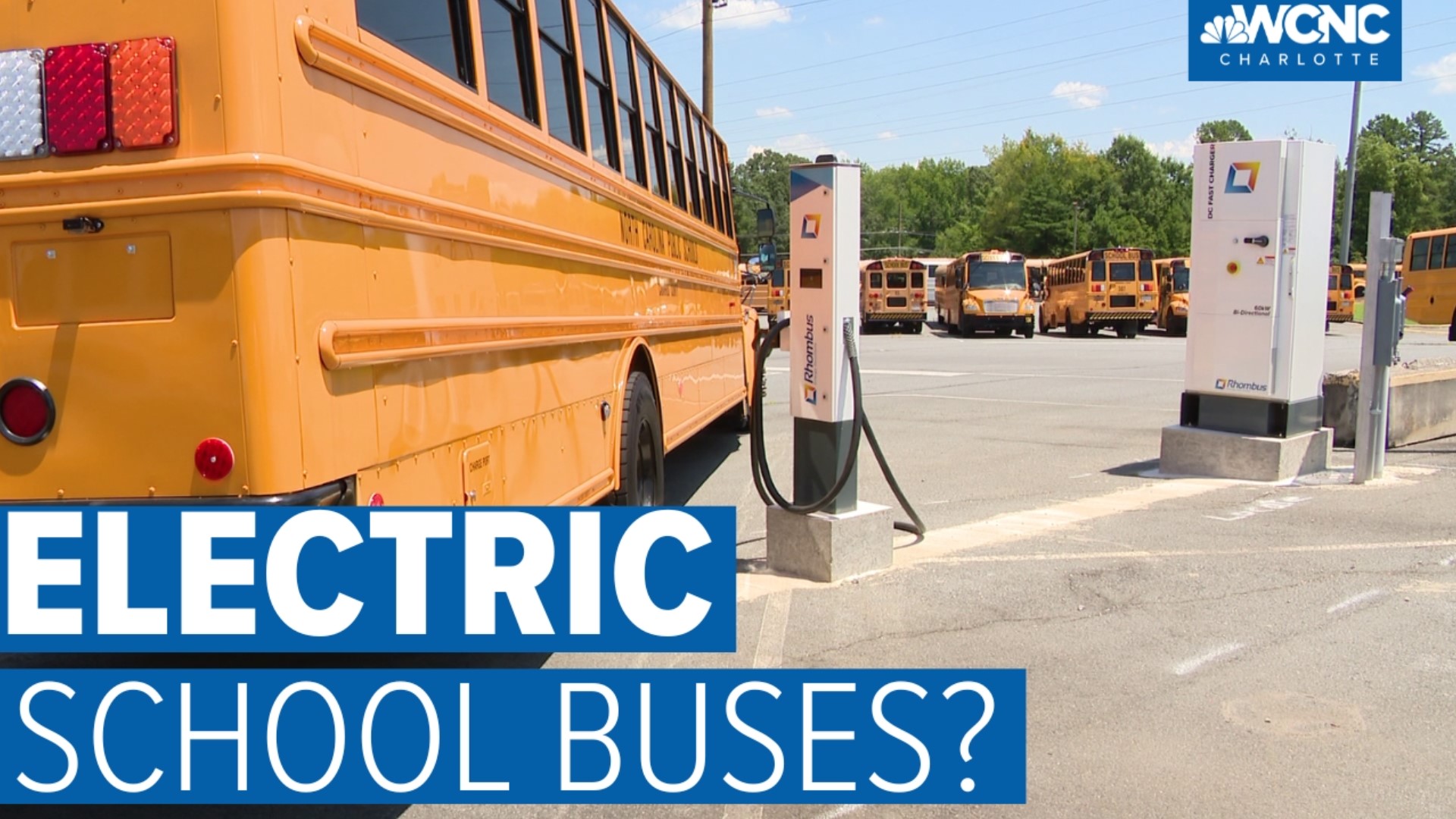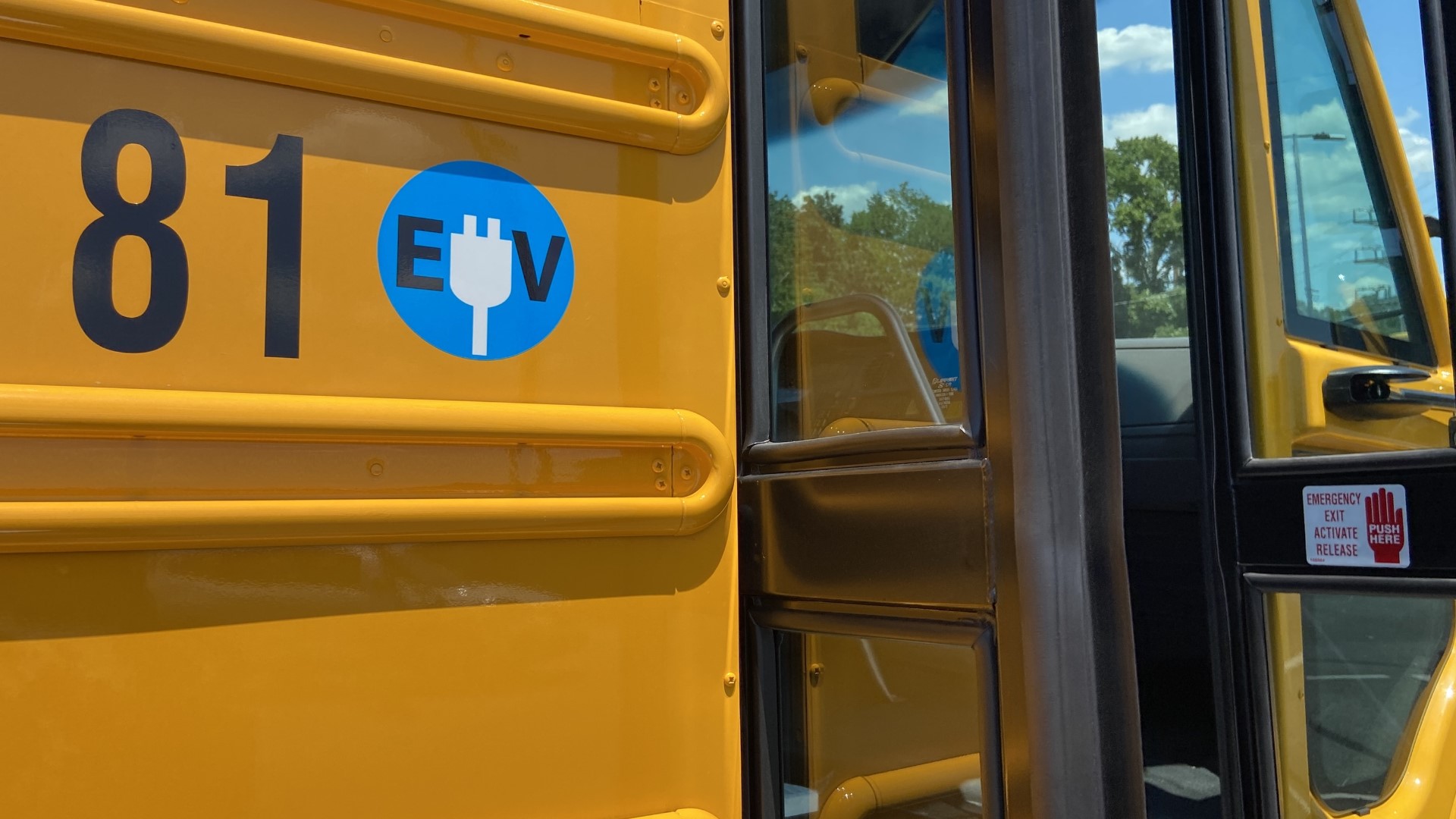CABARRUS COUNTY, N.C. — The future of school buses in North Carolina could be electric. State leaders are funding pilot programs to get electric buses on the roads this upcoming school year, and a Charlotte-area school district is included in the mix.
WCNC Charlotte got a first ride on Cabarrus County Schools' new electric bus Wednesday.
The bus has an average 135-mile run time on one charge, so it will stay in a certain perimeter.
"Our city routes are smaller, more compact, more urban," Art Whittaker, Cabarrus County Schools director of transportation services, said. "And then we're going to bring the vehicle back here to this facility and we're going to be charging that bus in between runs."
The Cabarrus County School System has one of three electric school buses in the state of North Carolina participating in a pilot program.
The bus was acquired through a grant from the North Carolina Department of Public Instruction. The grant funding came from the Volkswagen Settlement Funding. The funds represent North Carolina’s share of the $2.9 billion federal settlement with Volkswagen (VW) due to its misrepresentation of diesel emission standards in certain vehicles.
"It has zero emissions," Whittaker said. "It is also a part of our educational tool. We're an education system. So we feel we should be educating our future (kids) coming up. And also we feel it won't rely on fossil fuels anymore."
The bus is being used on city routes and can last for about 135 miles on a single charge. The bus is fully charged in two to three hours.
A barrier to school buses expanding their electric fleets is charging infrastructure and upfront costs of electric buses.
Right now, the district spends about $2.5 million in diesel fuel costs, which would cover about three of these electric buses and charging equipment needed.
According to the state electric buses currently cost about $420,000 for the bus and the charging equipment, the same-size diesel-fueled bus costs only $100,000.
Cabarrus County School's charging station can currently handle sharing four buses. The 60 KW generator used can power several devices and appliances simultaneously. The district said the generator power on its lot can power a small office building, a construction site, or a small hospital.
Advocates for the expansion of electric school buses said there’s more at stake than just cents and dollars.
Studies have shown that children who ride diesel school buses are exposed to harmful levels of air pollution. This pollution can cause a variety of health problems, including asthma, respiratory infections, and cancer.
One medical journal said children who are exposed to diesel exhaust from idling school buses are at increased risk of asthma exacerbation, decreased lung function, immunologic reactions, leukemia, and increased susceptibility to infections.
The EPA said diesel exhaust from buses has a negative impact on human health, especially for children who have a faster breathing rate than adults and whose lungs are not yet fully developed.
"All the studies that show how bad the air quality is, inside of the school buses that have diesel drives in particular," John Hipchen, Electric School Bus Coalition executive director, said. "So it's not good for our children to continue, it'd be a lot better if there were zero emission buses that they were riding,"
The Electric School Bus Coalition was founded by the copper industry group Copper Development Association to accelerate the adoption of electric school buses. The coalition's goal is to help school districts overcome the financial barriers to purchasing electric school buses.
"This technology is ready for purchase," Hipchen said. "What we were surprised by a couple of years ago when we looked into this was that almost every manufacturer of diesel school buses had an electric version, ready for sale.
One of the manufacturers is Thomas Built Buses, the manufacturer of the bus Cabarrus County currently has.
Kelly Rivera, Carolina Thomas' general manager, said they're ready for electric demand to increase but anticipate diesel to continue to dominate the purchasing space right now.
"Transitioning to electric is underway and we will see more and more of it you know, as the years go on, so for the foreseeable future, it's going to be a mix," Rivera said. "We look forward to supplying both products."
Cabarrus County anticipates having one more of the electric buses in its fleet by this time next year.
This is just the beginning of the electric school bus revolution in North Carolina. With more and more districts applying for grants and participating in pilot programs, it could be in the near future these buses become the norm.
Contact Shamarria Morrison at smorrison@wcnc.com and follow her on Facebook, Twitter and Instagram.


